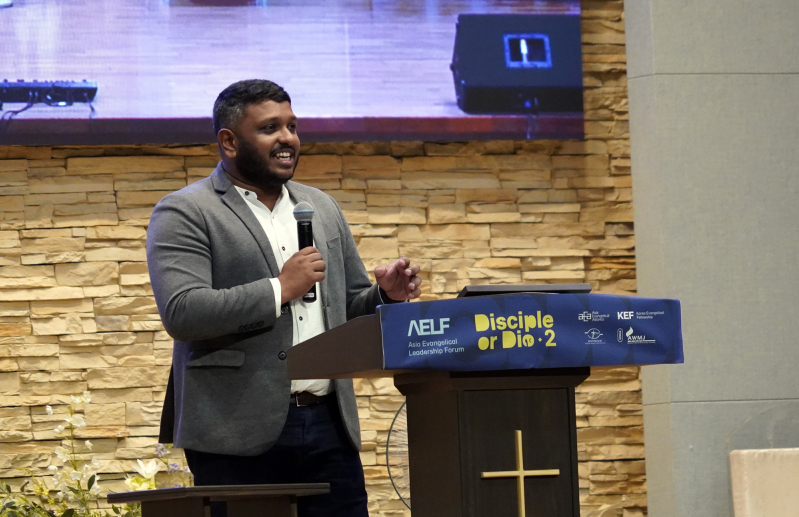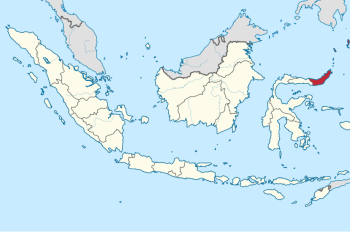
At the opening ceremony of the Asia Evangelical Leadership Forum (AELF), Sri Lankan evangelical leader Jerome Yashodhan Rasiah delivered a passionate and challenging address, calling on Asian church leaders to embrace the call of discipleship with radical obedience, daily renewal, and gospel-centered innovation.
Speaking immediately after the opening remarks by Dr. Bambang Budijanto, General Secretary of the Asia Evangelical Alliance (AEA), Rasiah underscored the urgency behind the forum’s theme, “Disciple or Die 2.” He opened by reminding participants that discipleship is not optional. “If you don’t disciple, what happens?” he asked, drawing from the forum’s title. “That’s how simple life is sometimes.”
Rasiah challenged the approximately 100 leaders from over 20 countries gathered in Seoul to move beyond superficial religious activity and instead submit to the full reality of Jesus in their lives and ministries. “A Jesus who does not challenge you, contradict you, or change you—cannot transform you,” he warned. “If we want a Jesus who helps us, He must have His own reality in our lives.”
Citing Mark 1 and Luke 14, Rasiah emphasized the radical nature of Jesus’ call to His disciples. Unlike traditional Jewish rabbis who waited for students to approach them, Jesus actively called fishermen and outsiders to follow Him—and to leave everything behind.
“Jesus is saying: I want priority over your career, over your ministry, over your family,” Rasiah said. “He doesn’t call us to perform. He calls us to follow.”
He explained that Jesus’ use of the word “hate” in Luke 14:26—“unless you hate your father and mother…”—was not about active hatred, but comparative devotion. “Jesus is calling us to follow Him so fully, so intensely, so supremely, that every other attachment looks like hate by comparison,” Rasiah said.
He urged leaders not to settle into comfortable ministry routines or allow their identity to be shaped solely by religious activity. Instead, he called them to rediscover where God is truly leading them in this season—not just where there is need or gifting.
“Let’s pause and ask: where is God really calling you?” Rasiah said. “Not just where you are busy or successful—but where He is personally leading you.”
A major focus of Rasiah’s message was the link between gospel renewal and gospel innovation. He explained that true spiritual transformation begins with daily awareness of sin, grace, and the reality of salvation—not merely doctrinal knowledge, but a lived experience.
“When people ask me if I’m a Christian, I say: I’m becoming a Christian,” Rasiah shared. “Because that’s the challenge—daily renewal.”
This constant renewal, he argued, is the source of creativity in mission. “Gospel renewal fuels gospel innovation,” Rasiah declared. “A leader gripped by the gospel doesn’t just protect the message—they find fresh ways to proclaim it.”
He cited Jesus’ approach as a model of contextualization: speaking eternal truths in the language and culture of His time without compromising the message. Rasiah warned that a refusal to adapt methods may not reflect faithfulness but fear.
“If our methods never change, maybe it’s not faithfulness—it’s fear,” he said. “The Spirit still speaks. The gospel still moves. Are we listening?”
Rasiah’s message was particularly geared toward a rising generation of Asian Christian leaders. He spoke of a recent gathering of over 100 leaders in a South Asian country who committed to evangelizing 100,000 people by 2033. The initiative, he said, represents a bold step of faith—not because they had everything figured out, but because they were willing to be used by God.
“I stand here as a young leader saying, I want to see God move in the whole of Asia,” he said.
He concluded by urging delegates to reflect on the transformative impact of wholeheartedly responding to Christ’s call. “What would Asia or your nation look like if we fully embraced Christ’s call, pursuing continuous Gospel renewal that sparks Gospel innovation?” he asked.
Together with Dr. Budijanto’s strategic overview, Rasiah’s stirring call framed the forum not just as a leadership event, but as a moment of deep spiritual recalibration. As Rasiah reminded his fellow leaders: “This could just be another conference—or it could be a game-changer. Don’t miss His voice in all the noise.”





